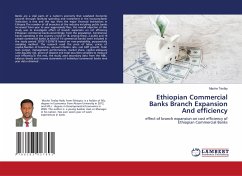Since the beginning of the 1980s, privatization has become a surge rather than a choice to Africa whereby its rejection has been deemed as infringement and anachronism no matter how immature the essential economic and social preconditions and inept the host governments bureaucratic institutions have been. In simple terms, privatization,like other impositions, has become a serious challenge due to the bullying nature of the international financial institutions/donor countries. Impossible to ignore, however, is that Ethiopia has unwaveringly stood against some of the tenets of privatization despite the West s stringent preconditions for aid, assistance and loans. This book, therefore, provides a clear picture of the challenges, achievements and weaknesses of the Ethiopian privatization program in terms of transparency, valuation, proceeds, FDI, pace and sequence, retrenchment, etc. The ideas are important to the IFIs, and to organizations committed to employees purposes and development issues.
Bitte wählen Sie Ihr Anliegen aus.
Rechnungen
Retourenschein anfordern
Bestellstatus
Storno








